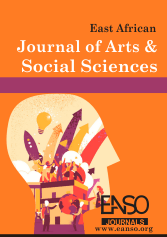Narrative Techniques Used to Portray Torments in Coetzee’s Disgrace, Slow Man, and Waiting for Barbarians
Abstract
This study aimed to demonstrate how selected literary texts by John Maxwell Coetzee dramatise the idea of torments surrounding the narration of social life and cultural order to embody and evoke characters’ cultural intricacies and anxieties. The study sought to explore the hidden tensions of the characters fighting within the self because there is a detachment between the individual and the sociocultural context, resulting to torments. The texts, namely, Disgrace (1999), Slow Man (2005), and Waiting for Barbarians (1980), were purposefully chosen because of their suitability in data that exposes the characters' torments. The most appropriate theoretical framework that allowed the selected texts to be read, interrogated, analysed, and interpreted is located within the lenses of Psychoanalytic Literary Theory and Concepts related to trauma by Sigmund Freud and Pallavi Sugoy. The theories aided in foregrounding the concepts in the three selected texts, the exploration of the unconscious conflict and its complexities on individuals. The qualitative research method was employed to explore how the characters negotiate torments in Coetzee’s selected texts. The study employed purposive sampling to select primary texts that vividly depict the specific torments of interest. Consequently, Coetzee’s works - Disgrace, Waiting for the Barbarians, and Slow Man - were chosen for their depth in illustrating these themes. An analytical research design was utilised to examine these literary texts, along with any supplementary secondary data that would facilitate a qualitative analysis of the material. The data identified from close reading was coded and decoded appropriately for literary analysis. These works explored profound themes such as the effects of empire and colonialism, the human condition in the face of societal and personal upheaval, and the quest for personal redemption. The study aimed to offer insights that would enrich the discourse in the literary realm, particularly concerning the interplay of power dynamics, cultural conflict and personal conflict. It is hoped that the study’s conclusion will make a significant contribution to the ongoing dialectics surrounding motivations behind human behaviour and relationships.
Downloads
References
Agamben, G. (1998). Homo Sacer: Sovereign Power and Bare Life.
Butler, J. (1990). Gender and Subervision of Identity.
Coetzee. (1999). Disgrace. New York: Penguin.
Coetzee. (2005). Slow Man. New York: Viking Press.
Coetzee. (1980). Waiting for Barbarians. Secker and Warburg
Davern, S. (2000). A Modern History.
Emma, W. (2019). Exploration of Language Identity in Disgrace. Philosophy of Education
Friedrich, N. (1887). On the Genealogy of Morals, C.G Naumann
Joseph, C. (2021). Heart of Darkness
Ladson, B. (2002). Racialized Discourses and Ethnic Epistemologies
Li, L. (2014). Silence as Right Choice, Resistance
Tannon & Troike. (1985). Perspective on Silence
Toni, M. (1985). Beloved, Vintage.
Copyright (c) 2025 Carolyne Chebet, Wanjiru Mugo, PhD, Stephen Mutie, PhD, Albert Mugambi Rutere, PhD

This work is licensed under a Creative Commons Attribution 4.0 International License.




























